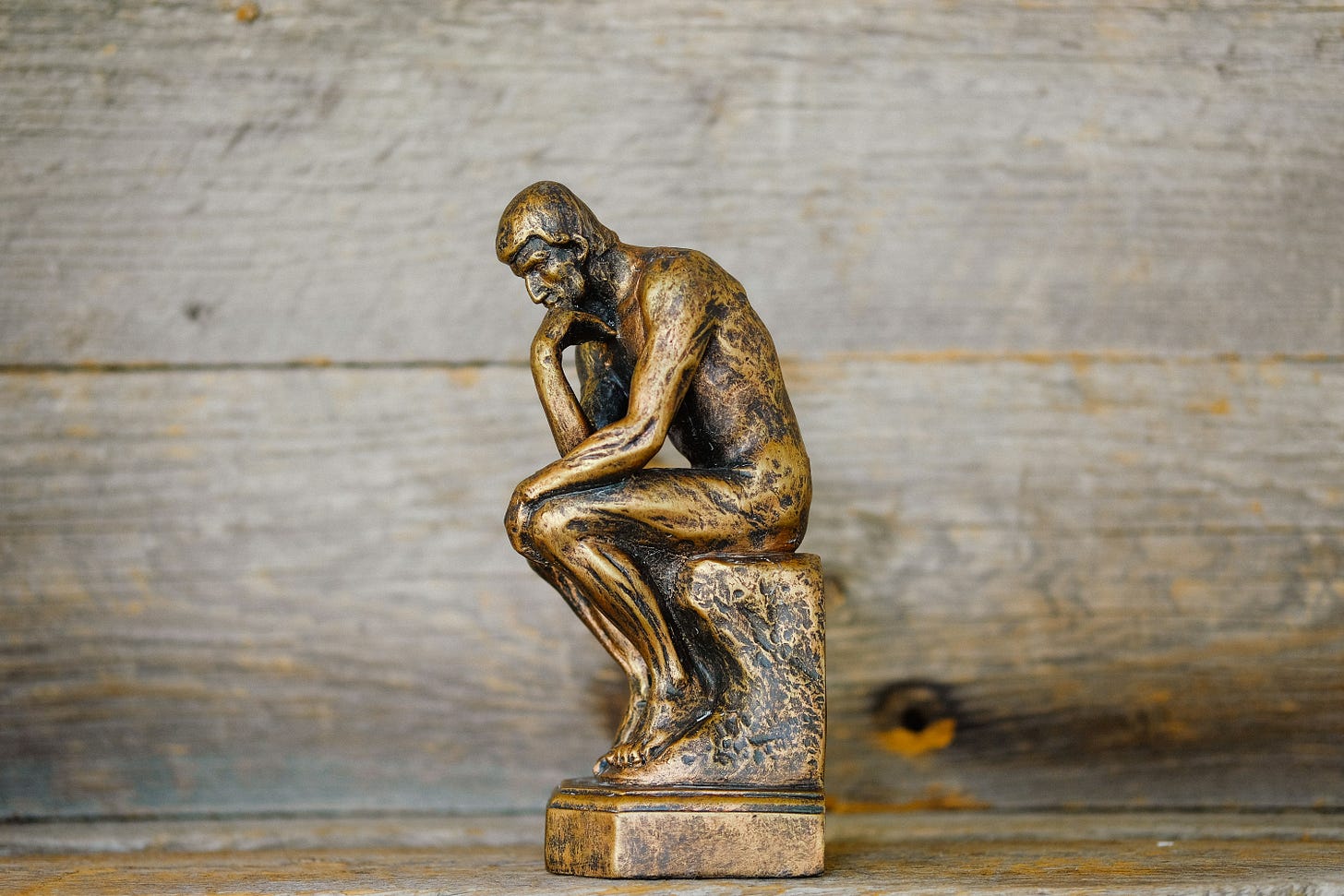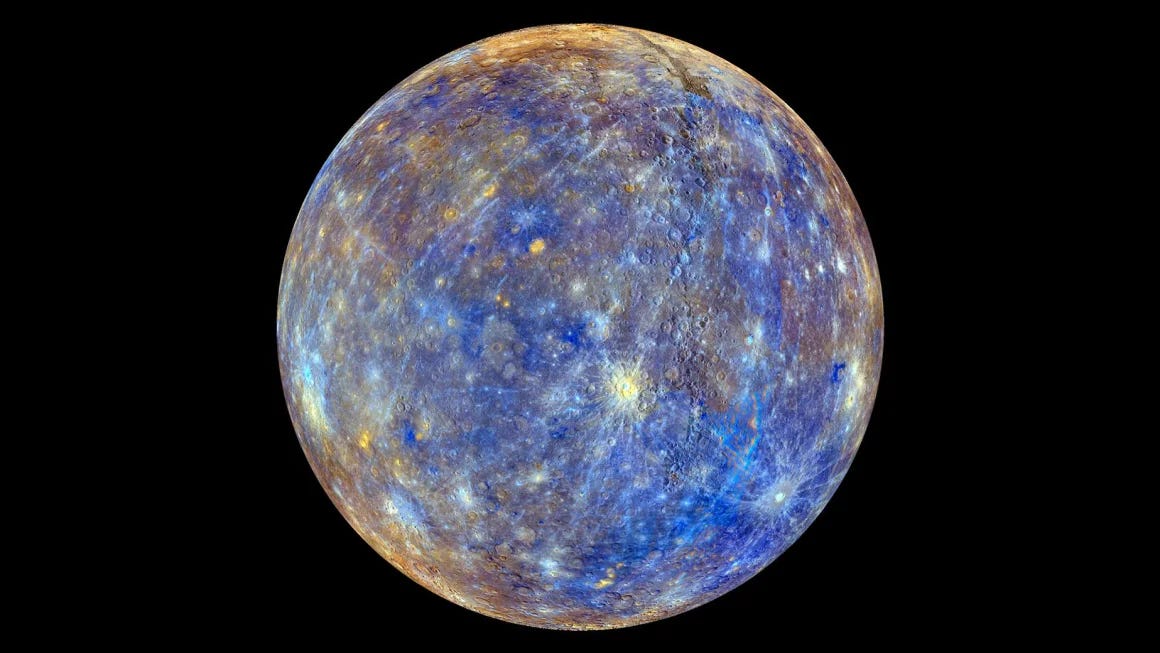It’s Thursday Things! This week we think hard about thinking and raid the secret jewel vaults of Mercury.
Rodin from Wish. This is a free newsletter. What do you want? Photo by Kenny Eliason on Unsplash
Thinking hard
If you think thinking is hard, you’re right.
It really hurts to think, new study concludes
Mental exertion leads to irritation, frustration or other negative feelings in many situations, supporting the concept that it hurts to think, according to new research published by the American Psychological Association.
No doubt. Hence the appeal for many of letting others do their thinking for them.
Or just winging it:
He pointed out that "there is a longstanding controversy in psychology about mental effort. Many psychologists assume that people avoid mental effort whenever they can."
They may take "mental shortcuts, like going with their gut feeling when making a decision, about something -- say, about which restaurant to go to -- rather than to weigh all relevant pieces of information, which is a lot of mental work," Bijleveld said.
I haven’t done any research on this myself, but I would imagine most people don’t do an extensive cost-benefit analysis when deciding where to have dinner, reserving that kind of effort for more consequential life decisions. You’ve only got so much mental gas in the tank each day. You’re not going to decide between Italian or Mexican in the same way you decide whether a rocket launch is go or no-go.1
Earlier studies indicate that people who can choose between two activities are more likely to opt for the one that requires less effort, he noted, adding, "In short, we know, generally, people prefer the path of least resistance, also mentally. So, it may well be true that people dislike mental effort."
Oh, it’s true. We all know it.
I could look up some data to back up that assertion, but that’s too much mental effort.
Anyhow, how is this insight that people would rather not think too hard useful for you?
Well, if you sell things, it’s gold!
Also, he observed that "when shoppers are making purchases, they may be more satisfied if given only a few good options rather than everything under the sun."
Give shoppers fewer options so that they have to exert less mental effort to buy from you. It’s the difference between selling two flavors of ice cream and selling 30 flavors.
You will not go broke scooping only chocolate and vanilla. Why complicate things?2
And if you’re in the business of producing passive entertainment that doesn’t ask much of its consumers, you’re in the sweet spot:
"This fact may also correlate with the overall rise in more passive forms of entertainment, media and leisure," Cox said. However, people shouldn't necessarily avoid something inherently strenuous, she added, citing exercise as an example.
True. Though part of the appeal of some forms of exercise, for some people, is that you can put your brain in park and zone out while running, swimming, or whatever.
On the flip side, our tendency to avoid mental exertion is something you can overcome if, for example, you’re a certain rising Asian superpower:
"This finding is intriguing," he said. "It could be explained by differences in school systems. Most of the data from Asia in our study was from China and Japan, and in those countries, children and adolescents do spend comparatively a lot of time on schoolwork."
As a result, "exposure to mental effort early in life may train people to become more able to withstand higher levels of mental effort later on," Bijleveld said, while cautioning that other explanations may exist.
Less geopolitically, if you want to achieve your goals you will need to learn to link reward with exerting mental effort as a way of overcoming that bias towards mental inertia:
"Challenges -- mental or otherwise -- are almost always part of the package when people are pursuing their goals and dreams," said Rosmarin, who also is a clinical psychologist at McLean Hospital, which serves communities in eastern, southeastern and central Massachusetts.
"Our culture is simultaneously allergic to aversion," he added. "But ironically, we pride ourselves on performance and success, which require withstanding adversity and being resilient in the face of stress."
Think about it.
Read the study here: “The unpleasantness of thinking: A meta-analytic review of the association between mental effort and negative affect.” Psychological Bulletin. Advance online publication. https://doi.org/10.1037/bul0000443
Mercury shining
Forget Lucy in the sky with diamonds — Mercury brings the bling!
Maybe.
Mercury could have an 11-mile underground layer of diamonds, researchers say
A layer of diamonds up to 18 kilometers (11 miles) thick could be tucked below the surface of Mercury, the solar system’s smallest planet and the closest to the sun, according to new research.
The diamonds might have formed soon after Mercury itself coalesced into a planet about 4.5 billion years ago from a swirling cloud of dust and gas, in the crucible of a high-pressure, high-temperature environment. At this time, the fledgling planet is believed to have had a crust of graphite, floating over a deep magma ocean.
There are a lot of assumptions baked into the “Mercury is made of diamonds” hypothesis. Researchers came to this conclusion by simulating what they think might have been the conditions of Mercury as a young planet. They used an anvil press to reproduce the pressure of a coalescing planet and a mixture of elements that mimicked the supposed composition of Mercury billions of years ago.
But never mind the caveats — A Mercury made of diamonds would be awesome! So it must be true!
For stargazers, Mercury is notoriously hard to spot — it’s small and close to the Sun, so you have to look up at just the right time to catch a glimpse. But if we scraped off the outer layers of Mercury so that it was literally like a diamond in the sky, I bet Mercury-gazing would get a lot easier!
You have to respect Mercury resisting the urge to flash all that ice. Image: NASA/Johns Hopkins University Applied Physics Laboratory/Carnegie Institution of Washington, via CNN.
If you enjoy this edition, please click the heart icon in the header or at the end of the post to let me know.
Thank you for reading!
Please click the hearts, leave a comment, and use the share feature to send this issue to a friend who might enjoy it. See you next Thursday!
As an Amazon Associate, I earn from qualifying purchases if you buy from one of the affiliate links on this page.
Nor am I going to put as much mental effort into a Thursday Things item as I would writing something I expect people to pay for. This is free entertainment, people! I’m making it up as I go along.
See The Paradox of Choice: Why More Is Less, Revised Edition (Paperback | Kindle | Audible) by Barry Schwarz, arguing that while having choices is good, the explosion of choices that we (in America specifically, the industrial world generally) have in terms of consumer products, careers, living arrangements, etc. is paradoxically a source of increased anxiety through decision paralysis, fear of missing out, and a variety of other maladies.
Having to make so many choices is exhausting, which is why many people tend to revert to a few defaults. It’s also why branding is so important, because that is a shortcut to making decisions that allows you to save mental effort. If you’re a Crest toothpaste person, you can ignore the other 40 kinds of toothpaste. (Of course that doesn’t help when there are 40 kinds of Crest, but you can pick Whitening Extra Peroxide Mint-Flavor and just stick with that.
Because thinking is hard and deciding uses up brain juice.
Alvin Toffler, of course, saw all this coming back in 1970 in his classic Future Shock. (Paperback | Kindle | Audible)




